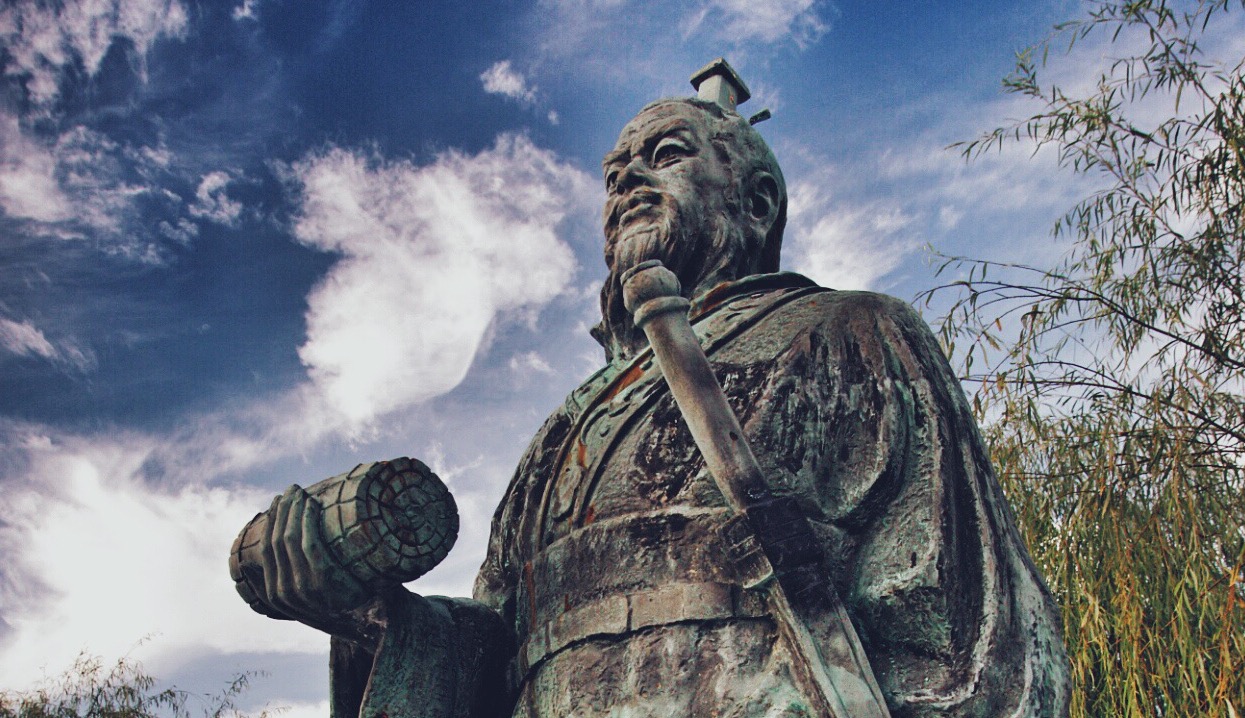
A statue of Chinese General Sun Tzu. Wikipedia
Around 25 centuries after they were put to paper, the tactics described by Chinese General Sun Tzu, the author of The Art of War, can still be very useful to a fighter like yourself. To Sun Tzu, a legendary strategist who lived in the 5th century before Christ, defeat in battle was never a matter of chance. Victory was reserved for those who knew how to identify and seize the opportunities presented.
“At first, be timid like a damsel”, he teaches. “But when the enemy gives you an opening, be quick like a hare, and he will be unable to offer resistance.”
Our team studied the 13 chapters of the classic and can confirm: the book, which is essential for generals and negotiators, also remains valuable for modern martial artists.
Check out below the seven lessons we extracted, and then go read this very concise book.
- Do away with empty words
Legend has it that on a certain occasion, a king gave Sun Tzu full powers for a mission, which he accepted. But the monarch eventually disagreed with his methods and fired him. Sun responded: “I’m impressed to know that the king likes empty words. You’re not capable of connecting them to actions, putting them to practice.” The brave reply reinforces the number-one lesson from martial arts: words only have value if connected to actions. Planning out your workout routine is worthless if you don’t do the work. Speaking of changing habits means nothing if you don’t act on it. Get rid of your empty words and be a valorous fighter.
- Courage and equilibrium make the great general
It’s not enough for a teacher or leader to be brave or be a great champion. Without equilibrium and wisdom, they won’t know how to respond to their students’ questions. Without courage, they don’t instill confidence in their students. As the book teaches, “If a general isn’t courageous and levelheaded, he will be unable to extinguish doubt or make great plans.”
- Every war is based on misdirection
According to Sun, to confound a rival is to win: “When capable, feign incapability; when active, feign inactivity. When close, make yourself seem far away; when far, make yourself seem close. Offer the enemy bait to attract him; feign disorder and strike him.” It’s equally crucial that when it’s time to attack, the strike be quick as lightning. “When thunder comes, there’s no time to protect one’s ears,” he writes.
- The supreme merit: to win without a shot fired
The ultimate victory in war, to Sun, consisted of winning without needing to use military force. The Chinese general was a fan of tactics and negotiation. Of using conversation to avoid the pain caused by war. Train hard, know your self-defense, and always be ready for any threat. But know that the supreme glory is to convince your fellow man, eye to eye, with the right words, that it’s a bad idea to fight you.
- Give your opponent an escape route
If at training you usually smash everybody but rarely finish, then you haven’t paid attention to Sun. The general teaches: frightening, surrounding and massacring the enemy is not a strategy. Cornered, any animal sees itself forced to fight to the death and won’t surrender. Wisdom consists of always leaving an escape route open, a chance for flight, so that the desperate enemy will run away and lay down their arms. In a fight, it’s necessary for you to make your opponent uncomfortable, but not to the point where they despair and keep resisting. The perfect plan is to attract them to a false escape route and allow them to turn their back and leave an arm behind while trying to escape. And then you finish.
- Ingredients of defeat
The general lists six basic conditions to attract defeat: underestimating your enemy’s power; an absence of authority; ineffective training; unjustifiable anger; disregard for discipline; and the inability to use your men.
- Don’t drink the wine of wrath
Sun Tzu says that ire can cause spectacular losses. You must empty your mind of personal matters and fight intelligently — never possessed by fury. In chapter three, the book tells a curious story. It was common, before battles in ancient China, for greetings and presents to be exchanged. So an emperor requested some wine to his opposing general. This general decided to try to win through provocation: he sealed a jar of urine and sent him. Overtaken by anger, the emperor lost his prudence and immediately advanced on the town, telling his troops to scale walls and fight hand to hand. “After thirty days without any success,” Sun writes, “the corpses piled up to the top of the walls. The dead exceeded half the emperor’s army.” Don’t let provocations get to you.
The post Don’t drink the wine of wrath, and more lessons: the art of war for fighters first appeared on Graciemag.